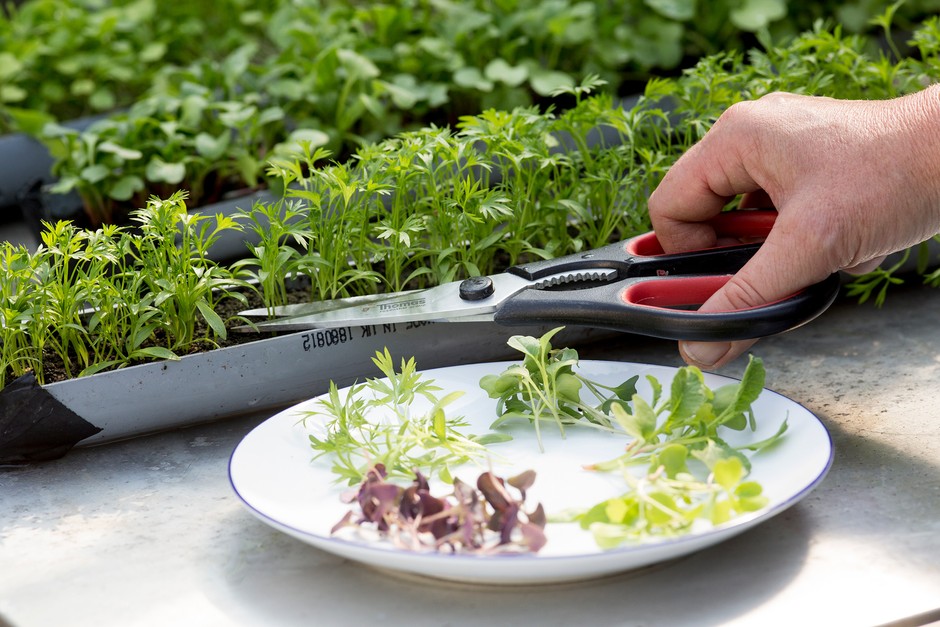1 Nutritional Benefits of Microgreens
Microgreens are small but mighty! They pack an impressive nutritional punch—often containing higher concentrations of vitamins, minerals, and antioxidants than their mature counterparts. The general rule is: the younger the plant, the richer it is in nutrients.
- Sprouts typically have the highest nutrient density, followed by microgreens, and then edible leaves.
- They are a natural source of Vitamin B12 (though amounts can vary depending on growing conditions). For people on a plant-based diet, this is particularly important since B12 supports nerve function and helps with the absorption of other nutrients, including iron.
- Microgreens are rich in Vitamin C, which enhances iron absorption from plant-based foods—especially crucial for those avoiding animal products.
- They’re high in fiber, supporting digestion, maintaining gut health, and promoting a feeling of fullness. This makes them a perfect addition to a plant-based meal plan that focuses on balanced nutrition.
.2 Ecological Benefits 🌎
Many people choose a vegan or plant-based lifestyle not only for health but also for ethical and environmental reasons. Microgreens align perfectly with these values:
- They require minimal water and land to grow compared to traditional crops.
- Their short growth cycle means less energy is needed from seed to harvest.
- Many microgreens are grown without pesticides or synthetic fertilizers, making them a cleaner, more eco-friendly food choice.
- Plus, by growing microgreens locally—or even at home—you reduce the carbon footprint associated with transportation and packaging.
.3 Easy to Use and Super Versatile 🍽
One of the best things about microgreens? They’re incredibly easy to incorporate into your daily meals!
- You can toss them on top of salads, blend them into smoothies, add them to sandwiches, wraps, or Buddha bowls, or use them as a garnish on soups and pasta.
- They enhance flavor—from spicy radish microgreens to nutty sunflower shoots—while also adding a beautiful, fresh look to any dish.
- No complicated prep is needed. Just rinse and enjoy!
.4 You Can Grow Them at Home 🏡
Microgreens are one of the easiest crops to grow indoors, even if you have limited space.
- You don’t need a garden—just a sunny windowsill, a few containers, and some seeds.
- Growing them yourself ensures they are as fresh as possible, harvested right before you eat them.
- It’s a fun and rewarding way to connect with your food, perfect for anyone interested in sustainable living.
.5 Easy to Digest & Gentle on the Stomach 🌿
Microgreens are light and easy to digest, making them ideal for people on a plant-based diet who are looking for nutrient-dense foods that won’t cause digestive discomfort.
- Their high fiber content supports healthy digestion.
- They are low in calories, yet packed with essential nutrients.
- Their tender leaves and stems make them gentler on the digestive system compared to mature vegetables or legumes.
.6 Clean Food with Minimal Chemicals 🚫🧪
When you choose microgreens—especially those that are organic or homegrown—you’re choosing clean, chemical-free food.
- Most microgreens are grown without pesticides, herbicides, or artificial fertilizers.
- They can be harvested without the need for preservatives or additives.
- This makes them an excellent option for anyone seeking to minimize their intake of processed or chemically treated foods.
.7 Delicious and Diverse in Flavors 😋
Microgreens aren’t just healthy—they’re also delicious and full of flavor!
- There’s a huge variety to choose from: spicy radish, earthy beet, nutty sunflower, mild broccoli, peppery mustard, and more.
- Their vibrant colors and delicate textures make any meal more appealing and enjoyable.
- They allow you to experiment with flavors and textures while maintaining a wholesome, plant-based diet.
.8 A Plant-Based Source of Protein 💪
Many microgreens offer a surprising amount of plant-based protein, making them a valuable addition to vegan and vegetarian diets.
- For example, sunflower microgreens contain around 2.3g of protein per 100g, while amaranth microgreens have 3.8g per 100g.
- Protein is essential for muscle repair, immune function, and overall health—especially important for those on plant-based diets.
- Including microgreens regularly can help meet daily protein needs without relying on heavily processed plant protein products.
.9 Health Benefits of Microgreens🧑⚕️
- Boosting Immune System – Microgreens' high nutritional content boosts the immune system. Rich in zinc (sunflower greens, pea shoots) and vitamin C (red cabbage, broccoli), they promote the generation of white blood cells and immunological function. While some, like onion sprouts and garlic, have antibacterial qualities, others increase the activity of natural killer (NK) cells, which aids in the battle against infections. Additionally, microgreens support a balanced gut microbiota, which is essential for strong immunity.
- Rich in Antioxidants – Antioxidants like polyphenols and flavonoids, which are abundant in microgreens, help fight oxidative stress, lessen inflammation, and lower the risk of chronic illnesses including diabetes, heart disease, and some types of cancer.
- Supports Heart Health – Studies suggest that microgreens, especially those from the brassica family (e.g., broccoli, kale), can help reduce LDL (bad) cholesterol levels and improve heart function.
- Regulates Blood Sugar Levels – Certain microgreens, such as fenugreek and red cabbage, have been found to help regulate blood sugar levels, making them beneficial for people with or at risk of diabetes.
- Enhances Brain Function – The high concentration of vitamins and minerals, such as vitamin K, folate, and iron, in microgreens supports cognitive function, memory, and overall brain health.
- Supports Skin and Eye Health – Microgreens like sunflower and pea shoots are rich in vitamin A, lutein, and beta-carotene, which contribute to healthy skin and protect against age-related vision problems.
- Detoxifies the Body – Some microgreens, like cilantro, have natural detoxifying properties that help remove heavy metals and toxins from the body.


